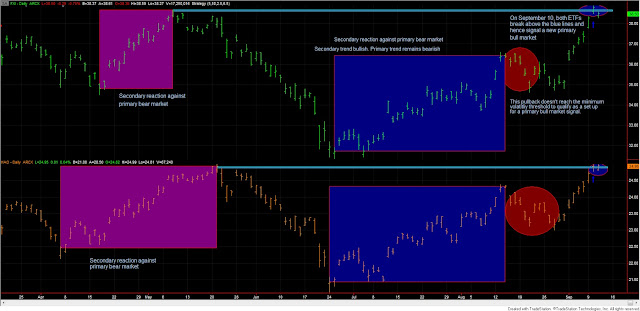Precious metals deflating
In a past post, I dealt with Chinese stocks and the then ongoing primary bear market.
My blog stats show me that I get a noticeable number of visitors from China. Thus, I think I should devote some more time to following the Chinese stock market. As I wrote in this post, the Dow Theory can be applied to non US markets.
Of course, when dealing with Chinese stocks I don’t have the privilege of having the +115 years’ track record available for US stocks. However, sound technical analysis is sound technical analysis, and hence the Dow Theory is an excellent tool with which to analyse the Chinese stock market. China is not to be neglected, and we can derive valuable insights by following the vagaries of Chinese’s stocks.
Thus, if both the Chinese and the US stock market are under a primary bull market, I’ll tend to conclude that this is positive for both stocks markets.
I am writing today this post because on September 10, 2013, a primary bull market for Chinese stocks was signaled by the Dow Theory.
Let’s study the entrails of such a primary bull market signal. As I did in the past, I will avail myself of the FXI ETF (which comprises 25 big companies) and the HAO ETF (which is a small cap ETF). If the stock market is really going to go up, then both big and small companies should confirm each other according to the main tenet of the Dow Theory.
The primary bear market closing lows were made on 06/25 (FXI) and 06/24 (HAO). From that point, both ETFs underwent a secondary reaction against the primary bear market (big blue rectangles on the right side of the chart). From 08/14 to 08/21 (FIX) AND 08/28 (HAO) both ETFs experienced a pullback. That pullback did not reach the minimum volatility threshold to set both ETFs up for a primary bull market signal.
As you know, when dealing with non US stock markets, I perform a volatility adjustment to account for the normally greater volatility of such other markets. Thus, instead of requiring just 3% on just one index for a “qualified” pullback to occur, I increase the required percentage by a volatility multiple. Example: if the daily volatility of HAO were double than that of the SPY, then I would require a minimum pullback of 6% (3 X 2).
In real time, when the pullback occurred, I performed the following calculations:
|
SPY
|
0.0052
|
SPY
|
0.0052
|
|
|
FXI
|
0.011
|
HAO
|
0.0098
|
|
|
Mult
|
2.11538462
|
Mult
|
1.88461538
|
|
|
Min mov
|
6.34615385
|
Min mov
|
5.65384615
|
Thus, a minimum pullback of 6.34% (FXI) and 5.65% (HAO) for at least one of the two ETFs was required in order to be meaningful under the Dow Theory.
Well, while very close, no ETF reached the required volatility threshold:
|
FXI
|
HAO
|
|
|
Sec Reac high
|
36.41
|
24.33
|
|
Pullback low
|
34.85
|
23.16
|
|
Pctg decline
|
-0.04284537
|
-0.04808878
|
And accordingly, I ignored the pullback and the last recorded secondary reaction highs (blue rectangles on the right side of the chart) as a primary bull market signal setup.
 |
| According to the Dow Theory Chinese stocks are in a primary bull market |
However, a primary bull market can also be signaled when the secondary reaction closing highs preceding the last primary bear market swing are jointly broken out. In such a case, there is no need for a “qualified” pullback. We just need to break above the blue horizontal lines. This is precisely what happened on September 10, 2013 when the FXI and HAO jointly broke above the secondary reaction highs of 05/08 (FXI) and 05/21 (HAO). Both secondary reactions are displayed in violet. The ellipses on the right hand of the chart highlight the breakup..
Tomorrow I’ll write more about the consequences of this new primary bull market signal, what to expect of it, and where to place the Dow Theory trailing stop. For the time being, it suffices to say that this primary bull market signal for Chinese’s stocks is tailwind for the US stock market. I may be wrong, but China seems to be saying that there is no liquidity crunch in sight. In any instance, I don’t care about the fundamental reasons, what I see clearly in the charts is that the odds favor higher prices for Chinese’s stocks.
Stocks
The SPY, the Industrials and Transports closed down.
The secondary is bearish, which implies an ongoing secondary reaction against the primary bullish trend, as explained here.
Today’s volume was smaller than yesterday’s, which is bullish as lower prices were not confirmed by higher volume. The overall pattern of volume remains neutral.
Gold and Silver
SLV closed up, and GLD closed down. For the reasons I explained here, I feel the primary trend remains bearish. Here I analyzed the primary bear market signal given on December 20, 2012. The primary trend was reconfirmed bearish, as explained here. The secondary trend is bullish (secondary reaction against the primary bearish trend), as explained here.
SIL and GDX closed down. SIL and GDX, unlike GLD and SLV, are unambiguously in a primary bull market under the Dow Theory, as explained here and here. The secondary trend is bullish as well.
Here you have the figures for the SPY, GDX and SIL which represents the only markets with suggested open long positions.
| DOW THEORY PRIMARY TREND MONITOR SPY | |||
| SPY | |||
| Bull market started | 06/24/2013 | 157.06 | |
| Bull market signaled | 07/18/2013 | 168.87 | |
| Last close | 12/09/2013 | 168.95 | |
| Current stop level: Bear mkt low | 157.06 | ||
| Unrlzd gain % | Tot advance since start bull mkt | Max Pot Loss % | |
| 0.05% | 7.57% | 7.52% | |
| DOW THEORY PRIMARY TREND MONITOR ETF SIL | |||
| SIL | |||
| Bull market started | 06/26/2013 | 10.59 | |
| Bull market signaled | 08/14/2013 | 15.36 | |
| Last close | 12/09/2013 | 14.09 | |
| Current stop level: Primary bear mkt low | 06/26/2013 | 10.59 | |
| Unrealized gain % | Tot advance since start bull mkt | Max Pot Loss % | |
| -8.27% | 33.05% | 45.04% | |
| DOW THEORY PRIMARY TREND MONITOR ETF GDX | |||
| GDX | |||
| Bull market started | 06/26/2013 | 22.22 | |
| Bull market signaled | 08/14/2013 | 28.7 | |
| Last close | 12/09/2013 | 25.29 | |
| Current stop level: Primary bear mkt low | 06/26/2013 | 22.22 | |
| Unrealized gain % | Tot advance since start bull mkt | Max Pot Loss % | |
| -11.88% | 13.82% | 29.16% | |
Sincerely,
The Dow Theorist




